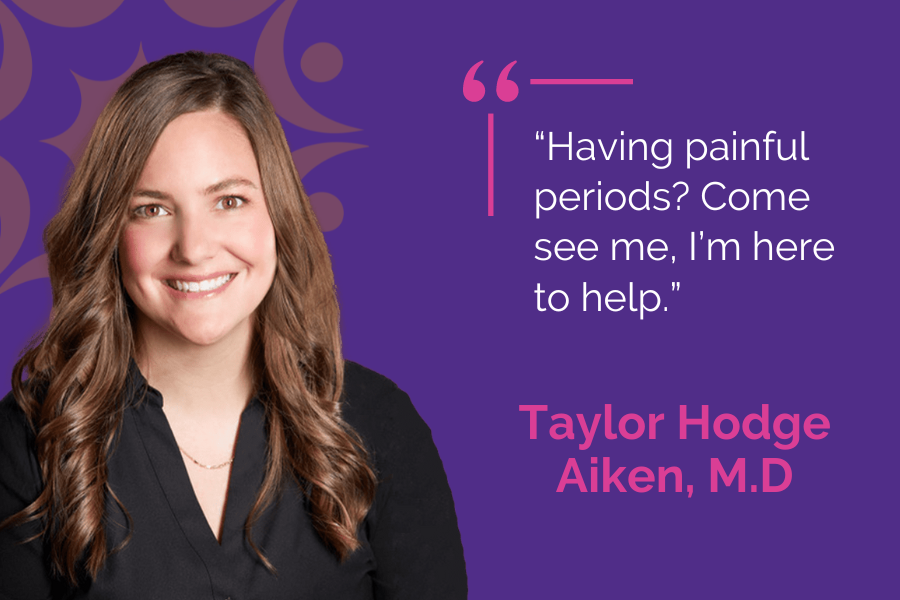Are you a teenager struggling with uncomfortable periods or a parent concerned about your teen’s menstrual health? Recognizing when menstrual pain may indicate a more serious condition is important.
Taylor Hodge Aiken, M.D., an OB/GYN at Women First, addresses this common yet often overlooked issue. Teenagers should not have to deal with uncomfortable periods.
Despite many believing that severe menstrual pain is a normal part of growing up, studies suggest otherwise. According to menstrual health research, approximately 30% of teenagers with heavy periods may have an underlying bleeding disorder, such as Von Willebrand disease, which significantly impacts their quality of life. In addition, conditions like menorrhagia (heavy menstrual bleeding) are not uncommon and can severely disrupt a teen’s activities and health.
At Women First of Louisville, we talk to parents and teens together about menstrual health and how to treat painful periods, among other issues. Here are a few things to discuss with your OB/GYN so you don’t have to live with uncomfortable periods.
What Causes Menstrual Discomfort?
Menstrual discomfort, or dysmenorrhea, involves pain during menstruation that can vary from mild to severe. It’s one of the most common health issues among adolescent females, affecting their school attendance, social life, and overall well-being. While some discomfort can be normal, pain that interferes significantly with daily life warrants a deeper investigation.
When periods are too painful, causing cramps that keep you in bed or a trip to the nurse’s office, it’s time to talk to a doctor about how to get relief.
What Causes Heavy Periods?
Heavy menstrual bleeding, or menorrhagia, can be particularly concerning. This condition is characterized not just by the volume of blood loss but also by how it affects an adolescent’s life — leading to potential anemia, fatigue, and even emergency medical situations. Recognizing the signs early and consulting a healthcare provider can prevent more severe health implications.
When Should Teens See a Gynecologist
 If menstrual pain or heavy bleeding is affecting a teen’s quality of life, it’s time to seek professional advice. Dr. Aiken emphasizes not dismissing severe menstrual symptoms as merely “part of growing up.” Conditions like endometriosis, while less common, could begin as early as the teenage years and require medical intervention to manage effectively.
If menstrual pain or heavy bleeding is affecting a teen’s quality of life, it’s time to seek professional advice. Dr. Aiken emphasizes not dismissing severe menstrual symptoms as merely “part of growing up.” Conditions like endometriosis, while less common, could begin as early as the teenage years and require medical intervention to manage effectively.
Female bodies need special attention during this growth phase, so parents and teens should feel comfortable talking to a gynecologist. This is the best way to get a diagnosis and stop recurring pain, heavy periods, and other issues.
What to Ask Your Doctor: Hormonal vs. Non-Hormonal Birth Control
When considering birth control options, your doctor is an invaluable resource. No question should be left unasked when making such an important decision. Here are some potential questions to discuss:

- Should I take hormonal birth control given my medical history?
- What’s the frequency of prescription refills required?
- Do any medications I take decrease the effectiveness of birth control?
- How can I manage potential side effects?
- Is it possible to transition from one hormonal method to another and what would be the side effects?
You can always consult with one of Women First doctors to get answers to all of your birth control questions. We’d be happy to help you find the perfect fit.
Next Steps for Uncomfortable Periods
 Understanding the difference between normal menstrual discomfort and symptoms that require medical attention is key to ensuring the health and well-being of teenagers. If you or someone you know is experiencing painful or heavy periods, recommend talking to a doctor at Women First. Remember, early intervention can make a significant difference in managing menstrual health effectively.
Understanding the difference between normal menstrual discomfort and symptoms that require medical attention is key to ensuring the health and well-being of teenagers. If you or someone you know is experiencing painful or heavy periods, recommend talking to a doctor at Women First. Remember, early intervention can make a significant difference in managing menstrual health effectively.
